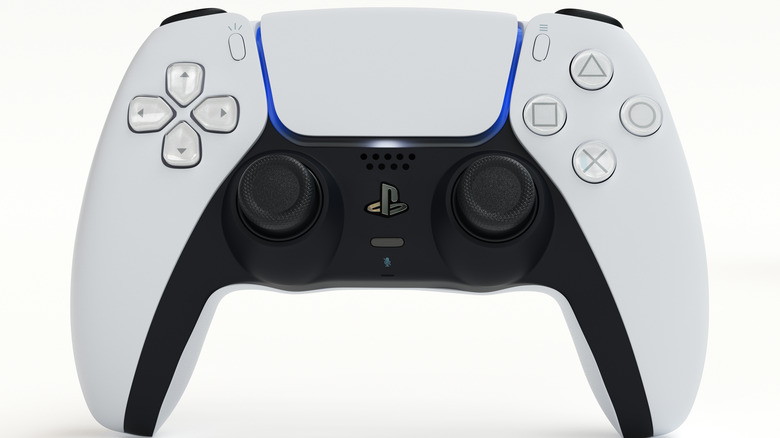Xbox Accuses PlayStation Of Anti-Game Pass Tactics
Microsoft's proposed purchase of Activision Blizzard understandably had the internet going wild when it was first announced. After all, if completed, it would be one of the biggest business deals in gaming, especially considering the massively successful titles that Activision Blizzard owns. If the deal went through, Microsoft would own franchises like "World of Warcraft" and "Call of Duty" — among many other great titles. If Microsoft ended up owning those games, it's fair for gamers to assume that it might want to keep the best sellers exclusive. That way, the logic goes, more people could potentially purchase and play Xbox systems. This is apparently something Sony has been concerned about, too.
However, Microsoft has now accused Sony of using anti-Game Pass tactics to scare companies away from partnering with it. This statement comes as part of an ongoing court case that seeks to prove that Microsoft isn't threatening other businesses with its Activision Blizzard purchase.
Shortly after Microsoft's acquisition of Activision Blizzard was announced, fans felt concerned about the future of "Call of Duty," acknowledging that Microsoft could choose to make it console exclusive. Xbox had good news about the series, with Phil Spencer claiming that the company had no plans to take "Call of Duty" off the PlayStation. Despite this message, fans have still be wary, concerned that Spencer's wording could mean the series would become exclusive in the future. Just acknowledging these fears wasn't enough, though. Sony took its complaints to court, and that move might have just backfired.
Has PlayStation blocked Game Pass?
While American agencies are investigating and evaluating the deal before it goes through, regulatory agencies all over the world are also listening in and going through vetting processes of their own. For example, the Administrative Council for Economic Defense (CADE) in Brazil is holding its own hearings to evaluate how other companies in the gaming industry feel about Microsoft's acquisition. While many developers, like Ubisoft, were more or less agreeable about the deal, Sony was concerned about the transaction, and more specifically, about the future of "Call of Duty" on the PlayStation. Sony argued to CADE that Microsoft holding exclusive rights to "Call of Duty" would vastly affect every other console, including PlayStation. "Call of Duty" is, in some ways, its own genre of game, the most prevalent FPS war game available.
CADE took Sony's comments into consideration, but also gave Microsoft a chance to respond to the claims. In response, Microsoft accused Sony of trying to discourage companies from signing up to feature games on Game Pass (via VGC). According to Chris Scullion at VGC, Microsoft argued that Sony sells more digital games than any other company, and that its hesitance to back Microsoft shows that it's not accepting of different business models, like Game Pass.
In the biggest bombshell from the CADE documents, Microsoft accused Sony of paying game developers to discourage them from being featured on Game Pass, writing, "Indeed, Microsoft's ability to continue expanding Game Pass has been obstructed by Sony's desire to inhibit such growth. Sony pays for 'blocking rights' to prevent developers from adding content to Game Pass and other competing subscription services." In other words, Sony allegedly provided financial bonuses for developers to not sign up for Game Pass, keeping Sony at the top of the market.
What do gamers think of the case?
In one ResetEra user's translation and summary of the CADE documents, they explained that Microsoft argued that although Sony said it was concerned Microsoft would make "Call of Duty" console-exclusive, the PlayStation maker has engaged in similar practices in the past by preventing games from joining Game Pass. This practice, Microsoft argued, also prohibits other companies from growing. After that section of the document, a redacted section obscures the specifics of Microsoft's comments, but the general feeling was clear. One gamer at ResetEra commented that Sony blocking games from making their way to Game Pass is a type of exclusivity that has existed for decades, and isn't very different from games that never leave the PC.
Gamers quickly got to work on the CADE documents, translating them from the original Portuguese and discussing the merits of Microsoft's claim. One gamer asked how Microsoft could see Sony's fears as unfounded, especially considering that big name Bethesda games – like "Skyrim" or the upcoming "Starfield" could potentially only have a future on Xbox. However, another player pointed out that "Call of Duty" is more or less a live service game, with new components being consistently released and a bustling economy that sometimes includes real world money. In other words, "Call of Duty" makes Activision Blizzard more money than just its initial purchase price.



